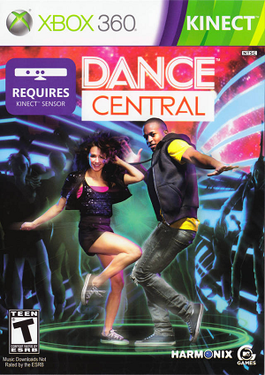Related Research Articles

Scene It? is an interactive film series created by Screenlife Games, in which players answer trivia questions about films or pop culture. The games were first developed to be played with questions read from trivia cards or viewed on a television from an included DVD or based on clips from movies, TV shows, music videos, sports and other popular culture phenomena. Scene It? was released on mobile and console platforms. After discontinuation in 2012, the series was revived in 2022, with streaming functionality replacing DVDs. It is owned by Paramount Pictures since 2008.
The Xbox 360 is a home video game console developed by Microsoft. As the successor to the original Xbox, it is the second console in the Xbox series. It was officially unveiled on MTV on May 12, 2005, with detailed launch and game information announced later that month at the 2005 Electronic Entertainment Expo (E3). As a seventh-generation console, it primarily competed with Sony's PlayStation 3 and Nintendo's Wii.

Kinect is a discontinued line of motion sensing input devices produced by Microsoft and first released in 2010. The devices generally contain RGB cameras, and infrared projectors and detectors that map depth through either structured light or time of flight calculations, which can in turn be used to perform real-time gesture recognition and body skeletal detection, among other capabilities. They also contain microphones that can be used for speech recognition and voice control.

Dance Central is a 2010 rhythm game developed by Harmonix and published by MTV Games for the Xbox 360 Kinect. It is the first installment in the Dance Central series. It was released on November 4, 2010, in most areas and on June 2, 2011, in Japan.

Kinect Sports is a sports video game developed by Rare and published by Microsoft Game Studios for the Xbox 360. The game utilizes the Kinect motion-sensing peripheral and was released in North America on 4 November 2010 as a launch title for Kinect, then, a few days later, in Europe and Australia.

Michael Jackson: The Experience is a music video game based on Michael Jackson's songs. It was developed and published by Ubisoft, and was released on 23 November 2010 in North America, 25 November 2010 in Australia and 26 November 2010 in Europe for the Nintendo DS, PlayStation Portable, and Wii. It was also released on 12 April 2011 in North America, 14 April 2011 in Australia and 15 April 2011 in Europe for PlayStation 3's PlayStation Move and Xbox 360's Kinect. The Japanese release on 8 December 2011 only revised the PlayStation 3, Xbox 360, and Wii consoles. The game features many of Michael Jackson's hits, such as "Bad", "Thriller", "Beat It", "Billie Jean", "Smooth Criminal", "Black or White", "The Way You Make Me Feel", etc. However, some songs like "Man in the Mirror" and "P.Y.T. " are excluded. Initial launches of the game included a limited edition replica of Jackson's sequined glove. It was later released for the Nintendo 3DS on 7 November 2011 in North America and 11 November 2011 in Europe, for iPhone and iPad on 7 December 2011 in North America and for PlayStation Vita on 15 February 2012 in North America, 22 February 2012 in Europe and 23 February 2012 in Australia. It was announced that the game would be released on Mac OS X, and iPad 2. The game sold 2 million units in two months, not including Japanese sales, making it one of the best-selling Wii title games.

Virtua Tennis 4, known in Japan as Power Smash 4, is the third sequel to Sega's tennis game franchise, Virtua Tennis. It was released on PlayStation 3, Xbox 360, Microsoft Windows, Wii and PlayStation Vita. This is the first main series Virtua Tennis game to not have an arcade release before the console releases. An arcade version was also released, which is powered by the PC-based Sega RingEdge arcade system. There are two versions of the cabinet: an upright 4-player cabinet, and a deluxe 4-player cabinet.

MotionSports is a sports video game developed by Ubisoft Milan and published by Ubisoft. The game was released on November 4, 2010, in North America, November 10, 2010, in Europe, and November 18, 2010, in Australia for the Xbox 360. It was one of the first games released for use with the Kinect sensor.

Burnout Crash! is a downloadable action racing video game in the Burnout series. It is developed by Criterion Games and published by Electronic Arts for PlayStation 3, Xbox 360, iOS via PlayStation Network, Xbox Live Arcade, and iTunes App Store.

Kinect Sports: Season Two is a sequel to Kinect Sports co-developed by Rare and BigPark, and published by Microsoft Studios. It was unveiled at E3 2011's Microsoft Conference for Kinect and released in October 2011. The game adds six new sports and voice control. As with the previous game, it requires the Kinect sensor. Along with its predecessor Kinect Sports, it has been released in the Kinect Sports Ultimate Collection bundle on 18 September 2012 with additional bonus content and extra sports in Season Two added, basketball, golf and skiing.

Kinect: Disneyland Adventures is a 2011 open world video game developed by Frontier Developments and published by Microsoft Studios on Kinect for Xbox 360, with a remaster for Xbox One and Microsoft Windows developed by Asobo Studio released in 2017 as simply Disneyland Adventures. It takes place in a recreation of Disneyland Park in Anaheim, California, circa 2011, with themed games in place of many of the rides, while motion controls are used to play the game.

Puss in Boots is an action game based on the film of the same name. It was developed by Blitz Games Studios, and released by THQ for Xbox 360, PlayStation 3, Wii and Nintendo DS. It features support for Kinect and PlayStation Move on the respective platforms.

Marvel Avengers: Battle for Earth is a video game developed by Ubisoft Quebec and published by Ubisoft for the Xbox 360 and the Wii U. The game is heavily based on the "Secret Invasion" storyline in Marvel comic books. The game was announced after the cancellation of the original The Avengers game based on the 2012 film of the same name, being developed by THQ. Battle for Earth was released in North America on October 30, 2012 for the Xbox 360, followed by the Wii U version on December 4. It was the first and currently only Marvel video game to be published by Ubisoft.

Nike+ Kinect Training is a fitness video game for the Xbox 360. It is developed in cooperation with athletics company Nike. The game was ported to Japan for release on 15 November 2012.

Self-Defense Training Camp is a sports video game developed by British studio AMA Studios and published by Ubisoft for the Xbox 360, and was released in North America on November 8, 2011. The game was also released in the PAL region under the title My Self Defence Coach on November 10-11, 2011. The game utilizes the Kinect motion peripheral. Ubisoft claimed the game will "help players develop the self-confidence they need to react more efficiently when facing troublesome situations, and allows players to discover ways of protecting themselves from various forms of physical assault."

Just Dance is a rhythm game series developed and published by Ubisoft. The original Just Dance game was released on the Wii in 2009 in North America, Europe, and Australia. The game consists of a variety of songs that are accompanied with choreography performed by on-screen dancers. Users play the game by physically mimicking the dance routine shown on screen and then are scored based on how accurately they followed the movement. Since its release, Just Dance has attracted popularity among a wide age range and dance skill level. It has been played in various contexts, such as entertainment, fitness and education. Just Dance continues to release titles every year, featuring new dance routines to popular or trending songs.

Xbox is a video gaming brand that consists of five home video game consoles, as well as applications (games), streaming service Xbox Cloud Gaming, and online services such as the Xbox network and Xbox Game Pass. The brand is produced by Microsoft Gaming, a division of Microsoft.

Finding Nemo is a CGI animated film series and Disney media franchise that began with the 2003 film of the same name, produced by Pixar and released by Walt Disney Pictures. The original film was followed by a standalone sequel, Finding Dory, released in 2016. Both films were directed by Andrew Stanton. The film series received widespread critical acclaim from critics and audiences with two films released to-date, the series has grossed $1.9 billion worldwide.

The Xbox One is a home video game console developed by Microsoft. Announced in May 2013, it is the successor to Xbox 360 and the third console in the Xbox series. It was first released in North America, parts of Europe, Australia, and South America in November 2013 and in Japan, China, and other European countries in September 2014. It is the first Xbox game console to be released in China, specifically in the Shanghai Free-Trade Zone. Microsoft marketed the device as an "all-in-one entertainment system", hence the name "Xbox One". An eighth-generation console, it mainly competed against Sony's PlayStation 4 and Nintendo's Wii U and later the Nintendo Switch.
SkyBox Labs Inc. is a Canadian video game developer located in Burnaby, British Columbia. Founded in 2011 by Derek MacNeil, Shyang Kong and Steven Silvester formerly from EA Vancouver, they are mostly known for their work with Xbox Game Studios on the Halo, Age of Empires and Minecraft franchises.
References
- ↑ Struck, Heather (14 March 2009). "Yoostar's Hollywood Dreams". Forbes. Archived from the original on 18 September 2012.
- ↑ "Yoostar Available Today in Bloomingdale's Stores Nationwide". PR Newswire. 26 August 2009.
- ↑ Baig, Edward (2 September 2009). "Yoostar lets anyone act opposite Hepburn, Brando". USA Today.
- ↑ "The Release of 'Yoostar on MTV' for the Xbox 360 Makes Kinect Owners the Star in MTV Shows and Music Videos". MarketWatch, Inc.
- ↑ "Yoostar 2: In the Movies for Xbox 360 Reviews". Metacritic . Fandom . Retrieved 12 July 2023.
- ↑ "Yoostar 2: In the Movies for PlayStation 3 Reviews". Metacritic . Fandom . Retrieved 12 July 2023.